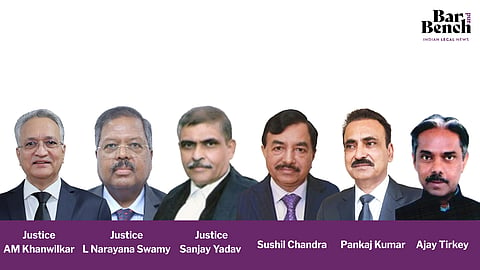
- Latest Legal News
- News
- Dealstreet
- Viewpoint
- Columns
- Interviews
- Law School
- Legal Jobs
- हिंदी
- ಕನ್ನಡ

On September 4, 2025, the Lokpal of India passed an order refusing to exercise jurisdiction over a complaint against Secretaries and Additional Secretaries of the Union Public Service Commission (UPSC).
Pertinently, it held that UPSC officials are not public servants who serve in connection with the affairs of the Union, and only serve in connection with the affairs of the Commission. As such, they are not amenable to the jurisdiction of the Lokpal under Section 14 of the Lokpal and Lokayuktas Act, 2013.
Through this piece, I argue that in doing so, the Lokpal has not only subverted the scheme of the 2013 Act, but also undermined the Constitution’s commitment to ensure public accountability for all officials.
The Act of 2013 was enacted to establish an independent mechanism to inquire into allegations of corruption against senior functionaries of the Union. Section 14 of the Act applies to the Prime Minister, ministers and Members of Parliament. It also brings within its scope Groups A, B, C and D officers and officials of the Central government.
The only qualification in the scheme of the Act is that such officers should be from amongst the public servants defined in sub-clauses (i) and (ii) of clause (c) of Section 2 of the Prevention of Corruption Act, 1988 (PC Act), while serving or having served “in connection with the affairs of the Union.”
As is evident from its language, the Act of 2013 borrows directly from the PC Act. Section 2(c) of the PC Act defines “public servant” to include any person “in the service or pay of the Government” or remunerated by government funds for performing a public duty and includes:
“(x) any person who is a chairman, member or employee of any Service Commission or Board, by whatever name called, or a member of any selection committee […] making any selection on behalf of such Commission or Board.”
Section 14 of the Act of 2013 is a code within itself. The exceptions to its application have already been explicitly and pre-emptively mentioned therein. By its very design, Section 14 was meant to cast a wide net of accountability on officials and not create exceptions through formalistic construction. Any dilution of the definition of ‘public servant’ imported into the 2013 Act through the PC Act is in fact an abrogation of the statute itself.
After limiting the scope of "public servant", the Lokpal in its order has also qualified the words “in connection with the affairs of the Union” and excluded their applicability to officials of the UPSC. In doing so, the Lokpal has raised a direct challenge to Part XIV of the Constitution.
The Constitution itself lends meaning and scope to the expression “in connection with the affairs of the Union.” Part XIV divides public services into two categories only: services in connection with the affairs of the Union and services in connection with the affairs of the States. As the Supreme Court has settled in Government of NCT of Delhi v. Union of India, no third category is envisaged under the Constitution.
By necessary implication, the administration of the UPSC is the constitutional responsibility of the Union and, therefore, invariably falls within “affairs of the Union.” By parity of reasoning, the administration of State Public Service Commissions is the responsibility of the State and falls within “affairs of the State.”
This reading is further fortified by the Constitution itself in Article 315(5) which states that:
“References in this Constitution to the Union Public Service Commission or a State Public Service Commission shall, unless the context otherwise requires, be construed as references to the Commission serving the needs of the Union or, as the case may be, the State as respects the particular matter in question."
Thus, as is evident from the above, the Constitution’s design itself enjoins that any references to the Public Service Commissions should be read as references to such Commissions in connection with the affairs of the Union or the State.
The Lokpal’s reading departs from this constitutional design, leading to at least two broader ramifications.
First, the order creates a striking anomaly. Secretaries and Additional Secretaries are recognised as “public servants” under the PC Act for the purposes of prosecution. This position has been affirmed repeatedly by the Supreme Court in a catena of judgments. However, with the order of September 4, the Lokpal of India has created a sub-class of Secretaries and Additional Secretaries (namely, those employed by a constitutional body such as the UPSC) who may be public servants under the PC Act, but will not be regarded as such under the Lokpal Act. The creation of this sub-class not only dilutes the overall definition of “public servants” but also lays the foundation for an argument that Secretaries and Additional Secretaries employed with other constitutional bodies should also be insulated from statutory accountability mechanisms.
Second, at its heart, the Lokpal is a typical ‘fourth branch institution.’ A fourth branch institution is essentially a distinct and independent public body, politically neutral and independent from the three main branches of government. Its purpose is to ensure integrity and improve the quality and resilience of democratic governance. Such institutions are designed to safeguard constitutional values that ordinary checks and balances may not be able to secure.
In this light, the order is a reading of the 2013 Act that insulates a set of public officials from accountability. If allowed to remain unchecked, it will set the tone for the gradual erosion of one of the Constitution’s most important guardrails against corruption and executive excesses.
Tanishk Goyal is an advocate practicing at the High Court of Judicature at Allahabad.